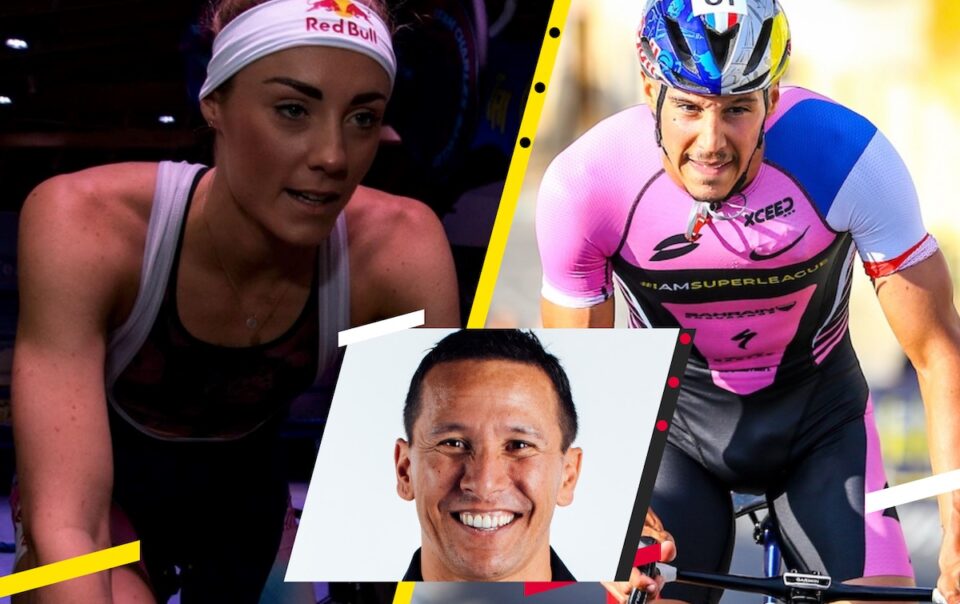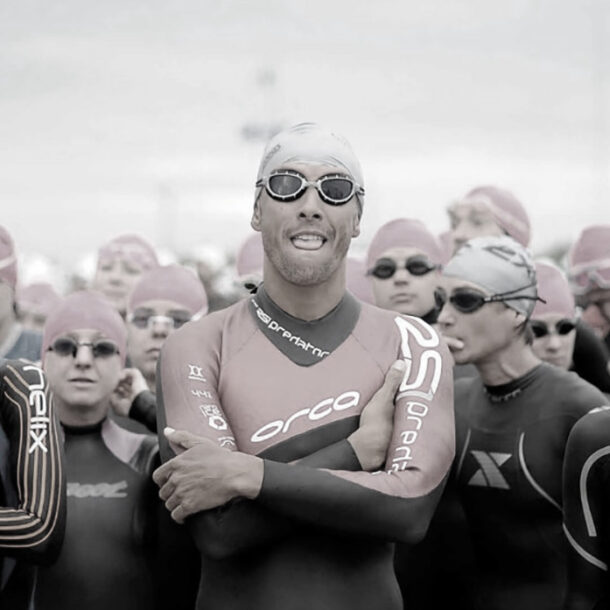
For me, triathlon is just cool. It was the reason I took up the sport as a youngster, it was the reason I dedicated my professional racing life to the sport, and it was the reason why, in retirement from competing, I have been committed to driving attention and disruption to the sport in a desire to bring it a broader mainstream appeal.
I am all for pushing the envelope, and to some degree the creative background of Super League prior to launching was the product of continuing to develop the delivery of this amazing sport and moving with the times in production, content creation, formats and environment.
With the SLT Arena Games we are continuing on this trend for what will be the first true marriage of reality and esports in a competitive environment.
Part of Super League’s DNA is being innovative. It is innovation with purpose, not just innovation for the sake of it. Every change we have brought to our racing from formats, from short chutes to colored jerseys, are a product of an innovative change to the status quo that is the sport outside of Super League.
Physical activity on its own is not enough. Exercise and sport are different things. What is needed for a sport to have relevance is not just the physical activity per se, but skill in the activity and accountability to an outcome.
The biggest difference between the two is sport’s innate need for open, fair and honest competition.
When we first launched Super League we were having the same conversations as we are now with the SLT Arena Games: is this going to work? Is it competitive and fair? Is it sport or just exercise? Is it a bit stupid? Does the outcome have significance to those competing?
These are critical conversations one must have when trying to develop and innovate, and create relevance for a league that inspires athletes to embark on preparing to compete in it.
We proved when SLT launched on Hamilton Island in 2017 it both can succeed, there is an appetite for it and innovation done right is a game changer. Dynamic, hyper-competitive and consequential racing, which was more engaging than most of the racing we were witnessing at the time.
We hope to do the same again when we host the first Arena Games event in Rotterdam on August 23, in the shadow of a global pandemic that brings with it a completely new operation rule book when it comes to staging events.
Whilst the event space is a little bit trickier to operate in, it does not kill off the burning desire of athletes to do sport. With the Arena Games our focus was to ensure that we provided that framework for great things to happen.
It is important to recognise that coronavirus has not eliminated the need for a competitive outlet for professional athletes. While amateur athletes to a degree have work and other things to fill their lives, for professionals the sport is all-encompassing and so 2020 has been hugely challenging for them.
Uncertainty is tough on anyone, but sport has to be one of the most affected industries on the planet. Professional athletes in particular who rely on activity, sponsorships, bonuses, prize money and some sort of training routine built around a global racing schedule had everything evaporate in a matter of days.
When Super League Triathlon started the Zwift cycle racing earlier in lockdown there was initially a slower uptake, and to be honest a lot of pessimism about bringing racing indoors and onto an esports platform.
As the realisation struck that the pandemic wasn’t going to be over quickly there was a big surge in interest from athletes who needed a competitive outlet, and much more acceptance from other stakeholders in our drive to get a professional, consequential and fair racing league off the ground that athletes could focus on. We went on and built our own SLT cycling league represented by global teams; it was a great outlet and surprisingly very heavily watched.
When we delivered a cycling league in the midst of lockdown, it was not a true representation of the skill set that the world’s best SLT athletes possess, as it reflected a single discipline strength.
As time went by our athletes jumped on board as they realised that this competition could fuel that burning drive that exists inside them, but it was not a true representation of the sport they are the world’s best at.
When we discussed potentially launching the Arena Games there was a lot of discussion around being one of the first sports to have a crossover between a real sports component attached to an esports component.
Lots of people have discussed trying to develop a triathlon-specific racing component through esports, but have shied away from the swimming component — because what they are truly trying to build is an exercise platform that involves three disciplines. This is not the sport of triathlon and is why we have never seen a competitive triathlon component of racing.
The innovation and the commitment we have brought with the Arena Games is the marriage of real-life sport racing consequence with esport platforms in a true triathlon format, and broadcast in a unique and different way: crossing over between a non-esports discipline component in the swimming pool, and the land components being delivered on an esports platform, with real-life transitions, coaching pens and the world’s best athletes competing for real money.
Going to a venue with a pool, putting the bicycles and treadmills on the side and forcing athletes to ride and run on them with the swim being the real component changes the dynamic of everything.
For the first time ever we have the fastest parts of triathlon done in a stationary position allowing us to interact and witness the athletes under huge duress on stationary bikes and treadmills. And then we rely on technique, skill and an ability to swim, with the delivery of a testing swim leg.
We can hold this as a COVID safe event meeting many restrictions to deliver it and because we can’t bring spectators we are focused on making the broadcast piece even more interesting.
It has made me excited because it brings in a lot of different elements compared to a normal triathlon. While the disciplines are the same, the delivery of them by each athlete is completely different to conventional racing, and drives a completely new approach, preparation and balance. In some ways, this could be physically harder.
There will be ten athletes with their heads down not worrying about what’s going on around them and putting out as much power as they possibly can, and maybe with some coaching input relaying on the icons on a digital screen, but an inability to rest and monitor that output or the effects it will have on the other disciplines.
In normal triathlon you say goodbye to your coach or loved ones and see them again at the finish but this won’t be the case with the Arena Games.
Like a soccer match, a coach could help give input to an athlete because it’s a controlled environment and the stationary position of the athletes allows this high-end coaching. While athletes could make these decisions on course in conventional racing, an outsider could instruct this in the Arena Games.
What I’m most excited about is the potential to talk to the athletes or hear input from the coaches to understand what is happening while it’s actually happening.
For the spectators at home, being able to see all the data and an esports avatar on the screen to view the actual racing will be interesting. You’ll see it all: run speed, heart rates, power, cadence and even sweat loss, which is a much bigger component in a stationary race than it is in a moving event.
It will also add a new dimension to the swim as it has traditionally always been the most difficult aspect to film and showcase in a triathlon.
Pool swimming is much different to open water swimming and requires different skills that can be exploited by those that possess them.
Swimmers will have a distinct advantage on those athletes who have a weakness in the water. Dives, flip turns and competitive positioning awareness become integral in this racing. Also, from a competitive point of view, each athlete has a lane so there is no benefit on sitting on feet which makes it a pure swimmer’s swim race. There is nowhere to hide for the fatigued athlete.
The Arena Games format has the potential to really isolate an athlete’s core discipline. An athlete who potentially is not technically as astute on the bike and run can still deliver a winning performance.
One example I would take is Summer Rappaport. She technically struggles on the bike but generates so much power and has a big swim and a big run. Her bike riding from a skills perspective is improving rapidly but has let her down in some of the SLT events around the world with our course design technicality.
In the Arena Games, an athlete’s core competence in the three disciplines is more relevant, with skill taking a backseat in the esports play.
It really showcases the engine power of an athlete. You are punching out a 4km maximum bike effort and that’s massive power and anyone who has suffered the indignity of a VO2 test will know that these massive all-out efforts sting really badly and can leave you in a mangled heap afterwards.
The delivery of that needs to be monitored. In a normal event you can sit on a wheel and use your skills to get a rest — but now there is no rest. It is just hard, consistent power and trying to be aware of what’s going on around you.
I think from a physiological point of view this may hurt a lot more than a normal race because you are not as visually aware of what’s going on. You sit there and put out power and see the icons on the screen but you’ve got to monitor that power and if someone is going out too hard you don’t know it’s too hard.
It’s going to be trusting numbers from experience, trusting feedback from the coach and transferring from the static position to the pool or the treadmills and getting them up to speed and crossing the finish line.
I think from a viewing perspective it has the potential to be really interesting and engaging. There is so much going on.
In a normal race we view the action but you’re not in the group, you’re not running next to them. Here the camera will be right on them, they will be dripping in sweat and suffering.
Potentially, as we refine this, it also has the possibility to be something that is an easier transition for athletes that are crossing over from other sports. Post an Olympic cycle, triathlon is often a benefactor. The likes of Lucy Charles-Barclay is a great example. An athlete misses an Olympic Games in swimming or running and they migrate to triathlon and spend three or four years playing catch-up as they learn the skills.
I think it’s going to be pretty cool.
Philosophy
“Great things happen to people who make great things happen.”
Navigate
chris@macca.com
Terms & Conditions
Privacy Policy




